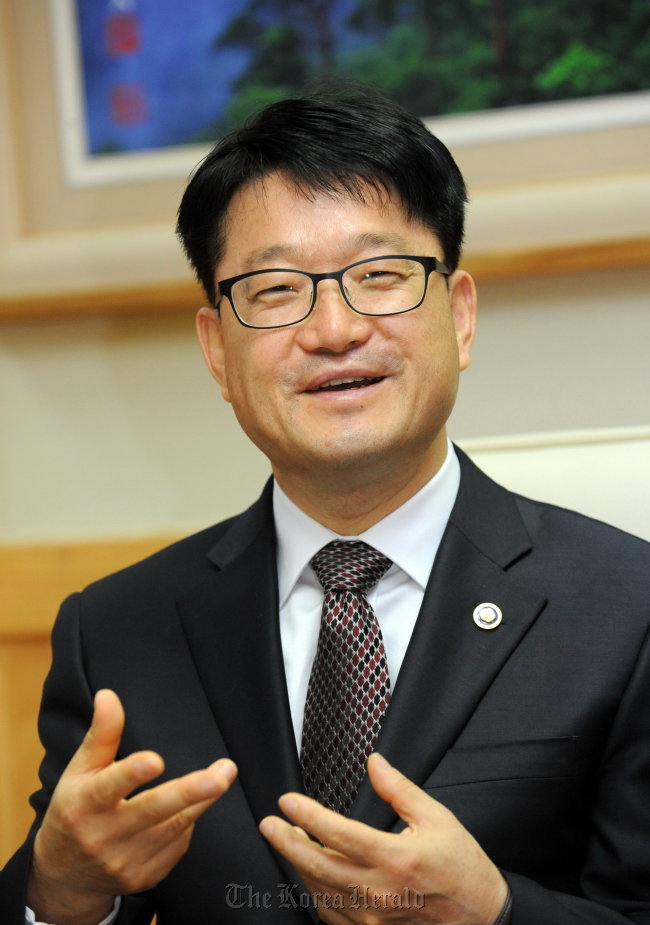New Korea Forest Service Minister Shin Won-sop revealed that the government agency will soon launch a “carbon sink” program through forestation.
In a written interview with The Korea Herald, the minister also explained the importance of forests and the history of the nation’s policy change on tree-planting, stressing the benefits forests give to the public.
He said the KFS has been also enhancing overseas tree-planting activities with the aim of increasing long-term domestic timber supply, securing a renewable energy source in response to climate change and enhancing national competitiveness
The following are the questions and answers made in the interview with the new minister.
Q. The importance of planting trees is at the center of green growth worldwide. In a related move, could you describe the meaning of Arbor Day on April 5?
A: Expanding and preserving forests is critical in that it is the only way to create a “carbon sink,” according to United Nations Framework Convention on Climate Change. Korea recognizes the importance of forests through the Arbor Day on April 5 every year. April is meaningfully engaged with the public in terms of historic and cultural sense, and it is a proper season for planting trees.
 |
KFS Minister Shin Won-sop |
Q. The major purpose of planting trees is to make our land green, but the type of trees preferred have been changed in Korea. Could you explain the changes?
A: In the 1960s and 1970s, the main purpose of planting trees in Korea was to reforest our devastated land, affected by the Japanese colonial era and the Korean War. In this period, fast-growing trees like Italian poplar trees were preferred for planting.
Entering the 2000s, the Korea Forest Service made a shift to trees to contribute to reducing carbon. In the near future, we will launch the carbon sink program through forestation, which is linked to climate change.
Q3. After a 40-year forest rehabilitation and restoration plan, Korea has been widely recognized as a successful model for forestation. What economic impact do forests have?
A: Forests give us intangible value by offering clean water, air, landscape and freshness. The economic contribution of forests is estimated at almost 7 percent of GDP, or 73 trillion won ($65 billion), according to the Korea Forest Research Institute. But, the estimate does not include such values as biodiversity, landscape and healing. If these values are included, the benefits that forests bring is even greater.
Q: KFS said two-thirds of Korea is covered with forest. How does this compare to other countries?
A: As of late 2010, forests cover 64 percent of our land. Korea is the fourth among OECD countries in terms of forest area as a proportion of its whole territory. The forest rate of the entire Korean Peninsula rises to 68.8 percent, which ranks the second next to Finland’s 72.9 percent. As we can see forests everywhere throughout the country, we can say forests represent Korea’s national status.
Q: KFS has done tree-planting projects in other countries. Where the has KFS made progress?
A: The KFS’s overseas tree-planting activities are aimed at increasing long-term domestic timber supply, securing a renewable energy source in response to climate change and enhancing national competitiveness. The KFS has already signed agreements with 12 countries for plantation and will continue to expand overseas plantation to 1 million hectares by 2050. The KFS has helped enlarging cooperation with countries having extensive forest resources and high potential.
Q: KFS has continuously pushed forward with its reforestation project of devastated forests. Could you explain this project?
A: Forest restoration means reinstating the structure and function of forests back to original condition, when forests were not devastated. Since 2006, starting with the forest restoration project around Baekdu-daegan, a chain of mountains along the backbone of the Korean Peninsula, the KFS has put emphasis on carrying a preservation project around the “Three Core Ecological Axes on the Korean Peninsula, which consists of Baekdu-daegan, the DMZ area, and sea coastlines. Through this project, the KFS has restored an area of forest almost the same size as Yeouido.
By Lee Kwon-hyung (
kwonhl@heraldcorp.com)





![[Exclusive] Hyundai Mobis eyes closer ties with BYD](http://res.heraldm.com/phpwas/restmb_idxmake.php?idx=644&simg=/content/image/2024/11/25/20241125050044_0.jpg)
![[Herald Review] 'Gangnam B-Side' combines social realism with masterful suspense, performance](http://res.heraldm.com/phpwas/restmb_idxmake.php?idx=644&simg=/content/image/2024/11/25/20241125050072_0.jpg)

